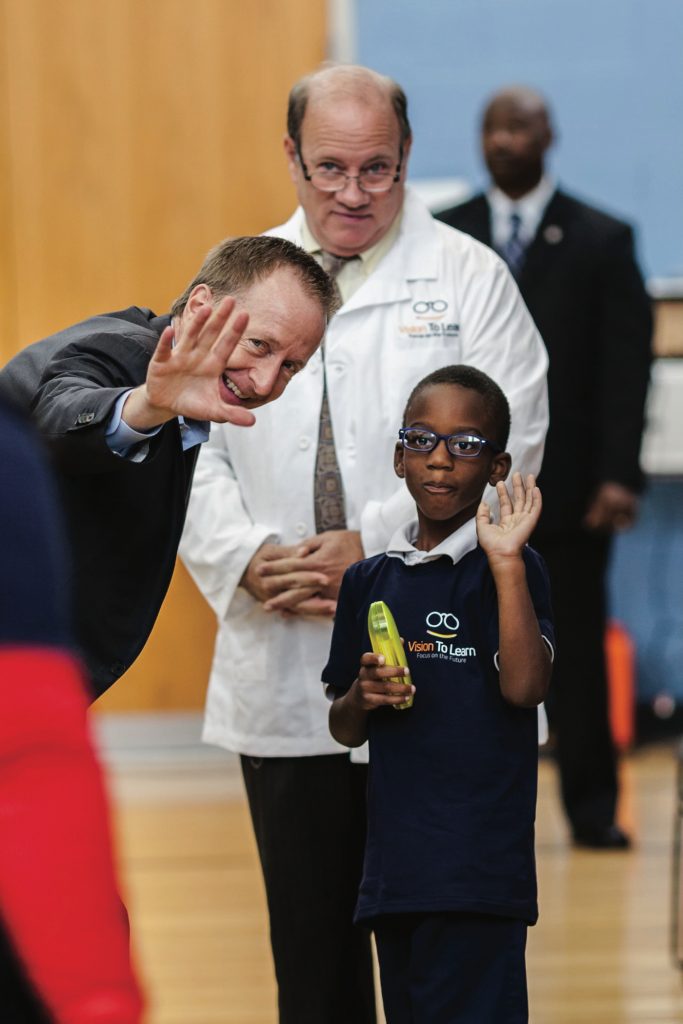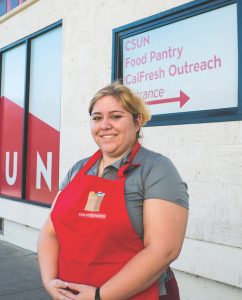The Problem Solver

When Austin Beutner was appointed first deputy mayor and “Jobs Czar” of Los Angeles in 2010, skeptics groused that the former investment banker had never worked in local government. When he became superintendent of the L.A. Unified School District in 2018, critics decried his lack of experience in education. Each time, he simply got to work and let the results speak for themselves.
Beutner wasn’t new to devising innovative educational solutions or to LAUSD. The district had been the test bed for Vision To Learn, a nonprofit that he and his wife, Virginia, founded in 2012 to provide children in underserved communities a basic ingredient for success in school and in life: eyeglasses. No cost, no hassle. Mobile eye-care clinics bring help directly to the students.
The nonprofit has since become the largest of its type in the nation, providing glasses to about 150,000 children in L.A. and another 100,000 in more than 500 low-income communities across California and 14 other states, leading to dramatic gains in learning. (See accompanying article on page 116)
Vision To Learn epitomizes Beutner’s back-to-basics, break-the-mold approach to problem solving. What’s more, the organization has evolved into a model for sustainable philanthropy, one that blends the entrepreneurial creativity of nonprofits with the scalability brought by public funding – in this case, Medicaid.
But first, back to the basics of Austin Beutner. He is often typecast because he has earned a considerable fortune, though many have scant awareness of how he rose from humble beginnings. His German-born father worked in factories; his mother taught reading in public schools. Born in New York, Beutner moved four times by the fifth grade, when his family settled in Grand Rapids, Michigan.
Growing up, he had jobs stacking boxes of detergent in the factory where his father worked, cleaning presses in a print shop, and driving a florist’s delivery truck. Beutner credits his family’s work ethic and public schooling for providing him with a foundation for success – and the enduring commitment to public education that led him to Vision To Learn and, later, LAUSD.
“I want to help children because many, many moons ago, I was that kid in the classroom,” Beutner says. “My journey is not so different from children we serve at Vision To Learn, in the sense that I grew up in a working-class family.”
His adult journey gained altitude: Dartmouth for college; at 29, the youngest partner at investment giant Blackstone; a Clinton-administration appointment to work on international economic development; then co-founder and co-CEO of Evercore, a leading independent investment firm which is now a public company with offices around the world. Beutner moved to L.A. with Evercore in 2000.
“I’ve had a lot of good fortune come my way. But mostly the Thomas Edison kind: 1% inspiration, 99% perspiration,” he says.
Misfortune prompted Beutner to change course. After incurring serious injuries, including a broken neck, in a 2007 mountain-biking accident, he decided to step away from business and focus on family and civic interests. Among them was CalArts, where he chaired the board of trustees, endowed scholarships that have since benefited more than 75 students and led the move – “before it was fashionable,” he says – to forgive many students’ debt upon graduation.
Beutner made a splashy entrance into public life as Mayor Antonio Villaraigosa’s top deputy, at a modest $1 annual salary. He cut red tape, lured business, and impressed many doubters as a quick study, strong listener, and consensus builder who got things done. A short-lived consideration of a run for mayor in 2013 was followed by an unsuccessful attempt to buy the Los Angeles Times and then a year as the newspaper’s publisher and CEO. Friction with the Chicago-based owners when Beutner refused to cut newsroom staff ended in his dismissal, to the dismay of L.A. civic leaders.
By then, Beutner was immersed in Vision To Learn, an idea that had come into focus after two revelations about access to eye care in poor communities. First, he was stunned to learn that the vast majority of students from low-income families who needed glasses didn’t have them. Second, even efforts to supply free glasses weren’t working, like a university ophthalmological-training program which had been using a mobile eye-exam clinic at places like malls. Students and family members spent time getting to the testing van, but only half of those who left with a prescription ever redeemed the voucher for free glasses.
Beutner flipped the script. To remove any obstacles, Vision To Learn would deliver free, full-service eye care where children are almost every day: their neighborhood school. “That way they can get glasses just like they get a textbook or a school meal,” he says. “All children at school will have access, so it becomes possible to solve the problem for every child.”
Early results in L.A. enabled Beutner to enlist other philanthropists, but public funding would be necessary to scale up. Eager to accelerate the program, then-LAUSD superintendent Michelle King delivered, along with support from the L.A. Clippers Foundation and many others, to help Vision To Learn expand from serving about 5,000 LAUSD students to 30,000 a year. The partnership established a model for other cities, where the program now mobilizes private and local-public support.
Still, Vision To Learn had to find a broader solution to fund its ambition of reaching every child nationwide. The breakthrough came during a lunch with Henry Waxman, the longtime congressman and champion of public healthcare, who has since retired. “He said, ‘Austin, philanthropy may need to be part of this, but the kids you are helping are eligible for Medicaid.’”
That set off a journey to understand the peculiarities of each state’s Medicaid and public-health policies and work to expand eyecare coverage. As its state-by-state efforts gain traction, Vision To Learn is reaching more students and building a sustainable model, one that flips the script again: Public-healthcare funding will be the core, and philanthropy will fill in reimbursement gaps.
As LAUSD superintendent, Beutner applied his laser focus to address a different challenge: early literacy. Many young students read at below-grade level; a problem made worse by the pandemic. They needed more than just glasses. They needed individualized help, which could be provided by adding reading specialists to assist classroom teachers.
Hence, the Primary Promise initiative, which aims to ensure every student has a foundation in reading and math skills by third grade. COVID-19 forced Beutner to close schools in March 2020, but to prevent struggling students from falling even further behind, he launched a pilot program that August, deploying an additional 200 reading specialists whom LAUSD had hired for Primary Promise. The 2,500 first graders, all weak readers, who participated raised their reading proficiency – measured by a simple, widely used assessment – by a factor of four to near-grade level and caught up with their peers in just 10 weeks. The program had expanded to about 8,000 kindergartens through third-grade students by June 2021.
“It starts with the need to understand the root cause of the problem you’re trying to solve,” he says. “Many have chronicled the importance of early reading and the challenge to make sure all students are proficient readers. We found a way to solve the problem.”
Beutner’s tenure at LAUSD began amid skepticism and the countdown to a teachers’ strike. It ended with widespread praise for his pandemic crisis management. He bought up every available Apple iPad for students and got Verizon to help provide free internet access to every student within days of closing schools. LAUSD operated the largest food relief effort in the nation’s history – providing 140 million meals to hungry children and adults – along with COVID tests and vaccinations for anyone in the community. Beutner authorized hardship pay for front-line workers – from Day 1 and long before other cities followed suit – and health insurance for any of the school district’s 86,000 employees who didn’t have it.
Now out of the maelstrom, Beutner muses about the “book I’ll write someday.” He deflects questions about a mayoral run, but then says that government needs more of the “can-do attitude” he brought to LAUSD. Whatever his next step, it won’t be about him.
“I get enormous satisfaction from helping solve a problem that makes someone else’s life better,” Beutner says. “That’s sufficient for me.”
